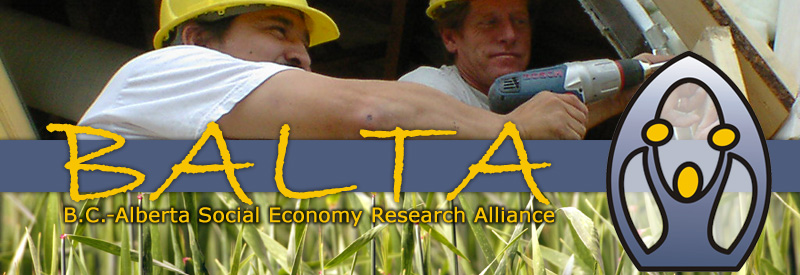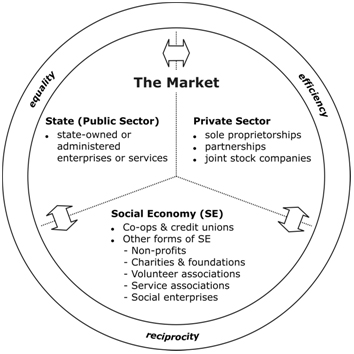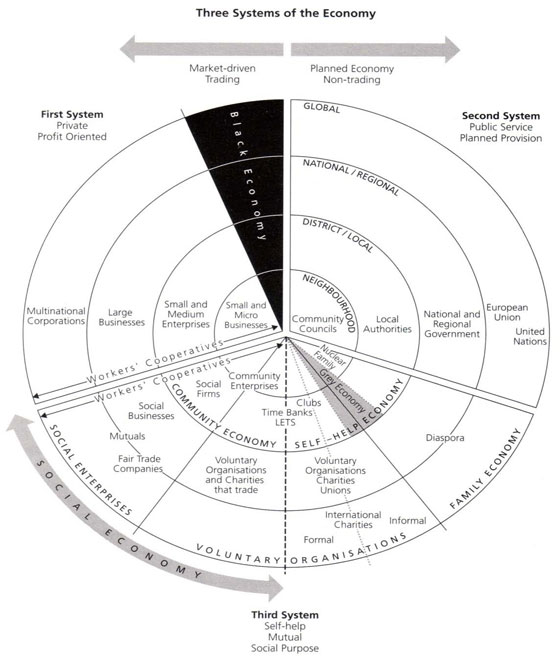
What is the Social Economy?
The term, ‘social economy’ – and ‘social enterprise’, another term often used in conjunction with social economy – are new for most Canadians. However, the range of organizations and activities associated with them are as old as the nation of Canada. They include co-operatives, credit unions, non-profit organizations and other types of enterprise. By some definitions, wherever you have people gathering together to pursue economic activities with a view to meeting social as well as economic needs, you have elements of the social economy.
The social economy can be defined in a variety of ways and there is ongoing debate about some of these definitional issues and the scope of what should be included in the social economy.
One definition is that the social economy includes those organizations which are animated by the principle of reciprocity for the pursuit of mutual economic or social goals, often through social control of capital. This definition would include all co-operatives and credit unions, non-profit and volunteer organisations, charities and foundations, service associations, community enterprises, and social enterprises that use market mechanisms to pursue explicit social objectives. It would thus include for-profit businesses, where those businesses share surpluses and benefits with members (and/or the wider community) in a collectively owned structure (e.g. a co-operative). In this definition it would not include those non-profit and voluntary organizations that are entirely grant or donation dependent (though some do include such organizations in their definitions of the social economy).
A similar definition describes the social economy as “collectively owned enterprises (co-operatives, non-profits and mutuals) that use market-oriented production and sale of goods or services to pursue a social mission” (Nancy Neamtan and John Anderson, 2010 National Summit on a People-Centred Economy Issue Paper #2: Social Enterprise).
The social economy is often contrasted to the public and private sector economies. In terms of intent, social economists are working towards the reinsertion of social goals, reciprocity and solidarity into economic thinking and decision making.
 |
The social economy viewed as one of three economic or market sectors. |
There is to date greater recognition of the social economy as a distinct sector in Quebec than elsewhere in Canada. In Quebec, ‘social economy enterprises’ are characterized as manifesting the following principles and structural features (from Nancy Neamtan, “The Political Imperative: Civil Society and the Politics of Empowerment”, Making Waves, Spring 04, vol. 15:1).
- aim to serve their members or the community as a whole, instead of striving for financial profit alone;
- are neither private businesses nor public agencies;
- establish a democratic decision-making process that involves the participation of users and workers;
- give priority to people and work rather than to capital in the distribution of revenue and surplus;
- are based on principles of participation, empowerment, and individual and collective responsibility.
In developing its own approach to defining and conceptualizing the social economy, BALTA has drawn from the work of the British academic, John Pearce, in his book, Social Enterprise in Anytown (2003, Calouste Gulbenkian Foundation) There are many similarities between Pearce’s analysis and the definitions noted above, but Pearce conceives of the three ‘sectors’ as three economic ‘systems’, with somewhat overlapping boundaries, each manifesting a particular organizing purpose. We find this systems approach a better reflection of the complex relationships between all three aspects of the economy where each system is “essentially about a different way of managing the economy, about a different mode of production”. The private sector, what John Pearce calls the first system, is profit-driven. It seeks to maximise financial returns to individual owners. The second system, the domain of governments, is about redistribution and planning.
The third system is about citizens taking action to meet and satisfy needs themselves and working together in some collaborative way to do this. It includes what we can think of as the family or household economy and extends into the range of ways people exchange with each other in local areas on a voluntary basis (barter, recreation, clubs, self-help groups, etc.). It also extends to a wide range of more formally structured organisations, some of which organise their affairs as charities (e.g. faith-based organisations, non-profits) or member-based associations (e.g. trade unions, service clubs), and others that explicitly pursue social goals using business means. The values of mutuality, self-help, caring for people and the environment are given higher priority than maximizing profits. The economic principle that animates organisations is reciprocity.
Organisations in this realm emphasize mutual and collective benefit. Pearce’s overall orientation is to elevate the third system to a much more strategic and dominant position as a way of organising our economic life. Within this third system, he situates the social economy as the more formally organized and market oriented part of the mutual and self-purpose system.
 |
Pearce’s depiction of the three economic systems and the social economy. |
BALTA has drawn from Pearce and others to elaborate a framework for defining, characterizing and researching the social economy. This framework is set out in a BALTA working paper, Mapping the Social Economy in BC and Alberta: Towards a Strategic Approach
Increasingly, a third pillar is being added to the blending of economic and social goals that has been the hallmark of the social economy, that of the ecological. Increasingly, social economists refer to a triple bottom line in defining the aims both of the sector and of aspirations for broader economic activity by all sectors of the economy.
Some prefer to use a broader definition for the social economy which encompasses the whole non-profit sector, irrespective of whether organizations engage in market-based economic activity or not. For those who espouse this view, ‘social economy’ is simply another perspective on what is also referred to as civil society, the non-profit sector, the voluntary sector, the third sector, etc., but a perspective that more explicitly recognizes the economic role and contribution of the sector. While recognizing this viewpoint, BALTA has primarily focused its approach around definitions that emphasize the use of market-based practices for achieving social and ecological as well as economic aims.




